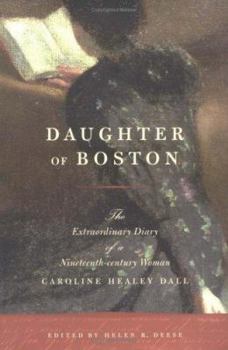Daughter of Boston: The Extraordinary Diary of a Nineteenth-Century Woman
Select Format
Select Condition 
Book Overview
A diary of an intellectual woman who participated in the transcendentalist movement of the mid-nineteenth century reveals details of her relationships with Ralph Waldo Emerson and Margaret Fuller,... This description may be from another edition of this product.
Format:Hardcover
Language:English
ISBN:0807050342
ISBN13:9780807050347
Release Date:October 2005
Publisher:Beacon Press (MA)
Length:452 Pages
Weight:1.95 lbs.
Dimensions:1.6" x 6.4" x 9.0"
Customer Reviews
1 rating
The conflicted journal of an ambitious, passionate, conventional woman
Published by Thriftbooks.com User , 19 years ago
Caroline Healey Dall's (1822-1912) diary, written over 75 years, encompasses 45 volumes and most of the prominent people and ideas - Transcendentalism, slavery, women's rights - of the 19th century. As editor, Helen Deese has focused on the years from 1838 to 1865, distilling Caroline's output into one volume, well annotated and footnoted with a general introduction and summary prefaces to each new section. The late 1830s and 40s were heady times for a young, devout, affluent, intellectual Unitarian like Caroline. Most of Boston's elite were Unitarians and the Transcendentalist movement, with its rejection of hard-line Calvinism, was blossoming. By the age of 18 Caroline was hobnobbing with the likes of Margaret Fuller and Elizabeth Peabody (sister to Nathaniel Hawthorne's new wife) at Peabody's bookshop. She knew Emerson and Theodore Parker, the Unitarian minister whose denial of Biblical miracles and the divinity of Jesus created a furor. Always ardent, Dall was swayed by Parker and passionate in her defense of him. The Transcendental idea of finding God in everyone and every natural thing had a profound effect on her whole life. Her early years were sheltered by class and family, leaving Caroline free to pursue a life of the mind. She had a strong will and intellectual self-confidence to match, though these were frequently undercut by her demanding father, for whom her efforts were never enough, and her exasperated mother who found her domestic skills wanting. Fuller and Peabody, as well, were sometimes critical of her vocal participation in meetings of her elders. The reader will sometimes share their impatience, though her parents do seem rather cold and erratic. But when Caroline entered her 20s circumstances changed drastically. At the beginning of 1843 she looks back on a tumultuous year: "I was an heiress, somewhat a blue [stocking] - flattered and caressed and with few anxieties save - for the characters of my brothers and sisters, the sufferings of the poor - and a heavy care of my own reputation." Then her father, a merchant and speculator, went bankrupt, a younger brother died and the man she loved rejected her. Caroline became a schoolteacher in Georgetown, near Washington D.C. Unitarianism was suspect and slaves were ubiquitous. The diary takes on a deeper, more mature character over this difficult period. Although she stayed only a year, it was enough to change her laissez-faire attitude about slavery and to get her engaged to a likeminded, but weaker willed minister. From this point Caroline's diary is increasingly intense. While her father's financial affairs improved, her relations with him deteriorated over her abolitionist writing and activity, which he feared would harm him in business. Her husband was often disturbed by her forward behavior and his own politics made it difficult for him to keep a post. Caroline grieved that he could not provide her the emotional support she provided him, and poverty, pregnancy, drudge





